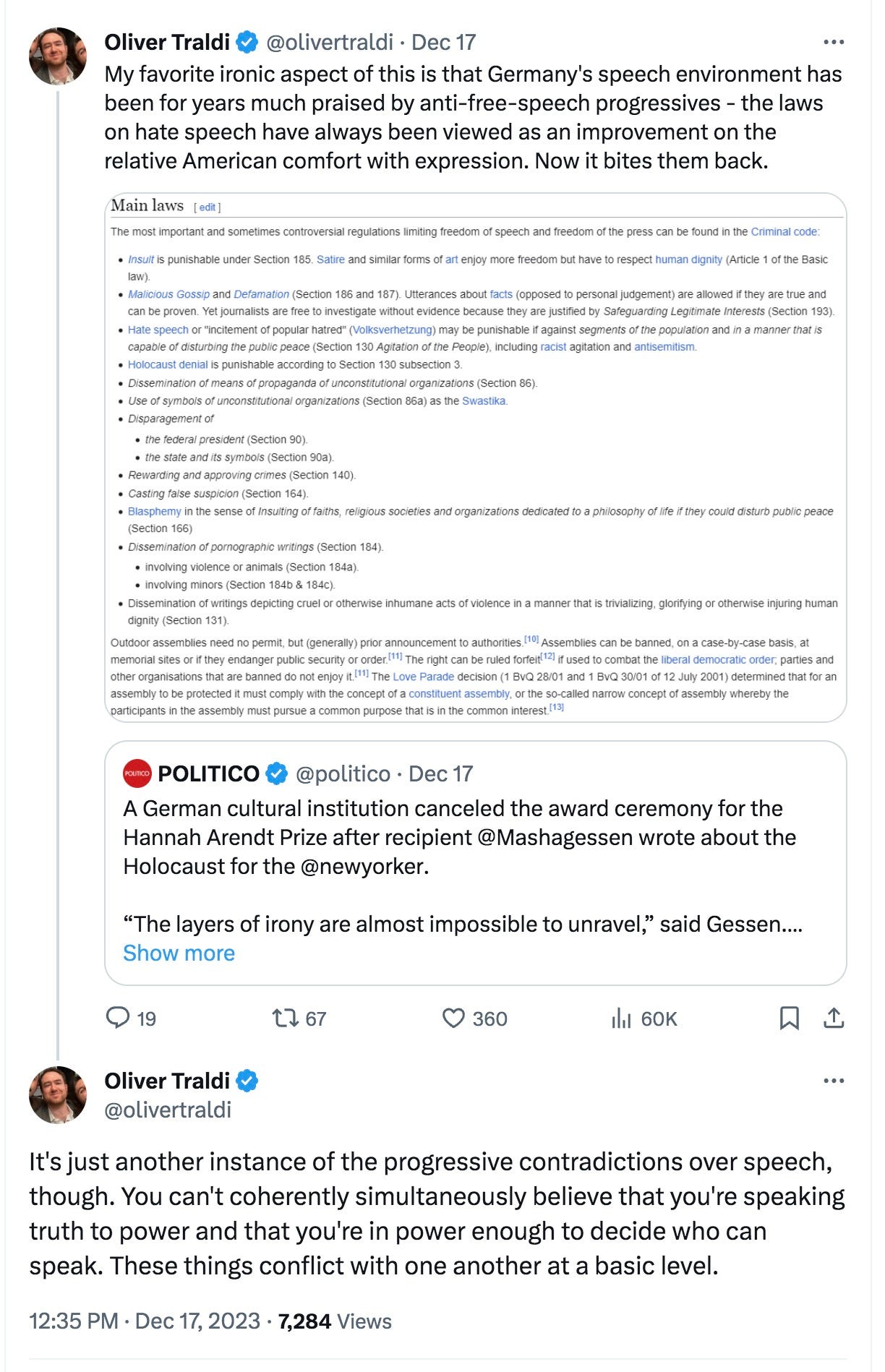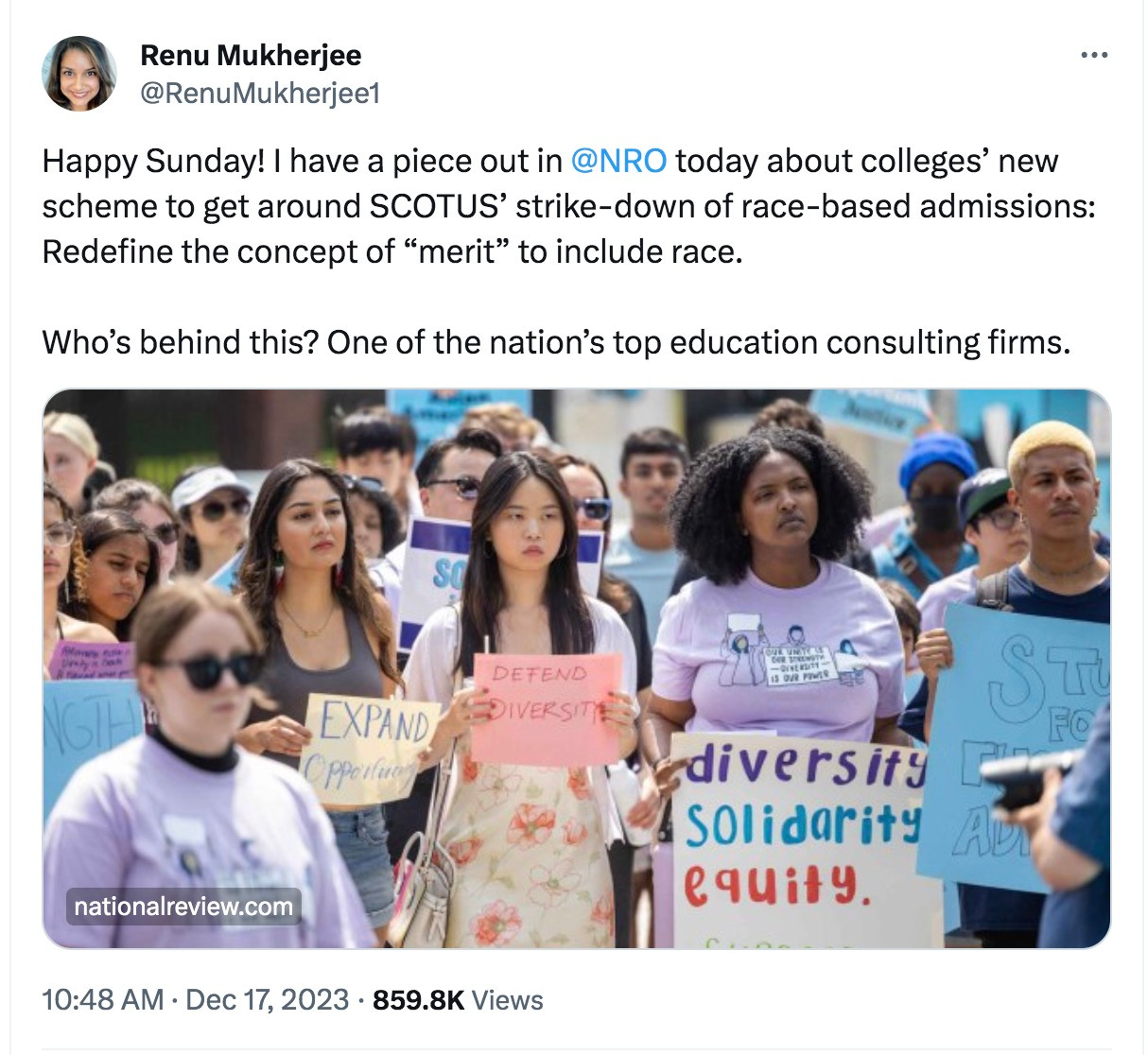E-Pluribus | December 18, 2023
Who wants to be an expert? Accentuating the positive; and the lowdown on "progressive education."
A round-up of the latest and best musings on the rise of illiberalism in the public discourse:
Bryan Gentry: Disagreeing To Agree
First, in case your mind works like mine, re-read the above title and see if you read it as “Agreeing to disagree.” For this Discourse Magazine essay by Bryan Gentry, the title flips the cliche to emphasize the “agree” part of the phrase. Gentry says while our reflex may be to highlight our differences, perhaps more could be accomplished if we emphasized common ground instead, an area that Gentry says is larger than we might think.
[I]t’s difficult to imagine any middle ground on abortion or gun control in the U.S. But according to a 2022 Pew poll, more than half of pro-choice Americans said that abortion’s legality should depend on how far along a pregnancy is, while a third agreed at least somewhat with the statement, “Human life begins at conception, so a fetus is a person with rights.”
On gun control, half or more of Republicans support background checks for purchasers at private sales and at gun shows, a federal database to track guns and bans on assault-style weapons and high-capacity magazines.
These stats might surprise or confuse pro-life protesters and gun control advocates. America has a political perception gap, meaning Democrats and Republicans both overestimate what percentage of people in the opposite party hold extreme views. This perception gap may result from moderate voters’ tendency to support more extreme candidates and parties “insofar as these parties pull policy in a desired direction.” Two voters might have similar ideas, but because one leans right and the other left, they seem miles apart.
Rather than find common ground, Americans tend to gravitate toward more heated arguments based on partisan disagreement—or stop communicating altogether. In the 2020 election cycle, nearly half of U.S. adults stopped talking politics with people with whom they disagreed. At the same time, the dynamics of social media reward attacking the opposition. By overlooking our common ground, we become more polarized.
The good news is that open communication could reverse the trend. New research by More in Common shows that hearing people from the opposite party share what they actually believe reduces partisan rancor temporarily. Hearing someone within one’s own party clarify the other party’s beliefs helps, too.
Real-life examples abound. In Arkansas, a series of dinner discussions helped fish and game regulators win hunters’ support for some regulatory changes. In Utah, a joint commercial by two opposing candidates for governor reduced support for partisan violence.
Read the whole thing.
Samuel J. Abrams: Progressive Education Isn't What You Think It Is
Just as “progressive” isn’t really a synonym for the old-time meaning of “liberal,” applying those terms to education creates the same kind of confusion. Rather than focusing on self-esteem and students’ “own truths,” real progressive education, Samuel Abrams writes for Real Clear Education, means “[teaching how to] establish truth, teaching resilience when mistakes are made, and demonstrating how to grow from errors and misfires.”
I was intrigued by a recent headline declaring that “progressive education made my peers morally confused.” In the piece, the author clearly, though understandably, confuses progressive education with progressive politics. To be clear, progressive teaching is not inherently ideological. Many who work in education happen to hold strong progressive views, making progressive pedagogical schools appear extremely liberal. However, progressive teaching does not hold a political predisposition—and nor should it.
Specifically, the piece talks about Friends Central School in Philadelphia, a Quaker school with Quaker values and a traditional pedagogical teaching style—I would know, I grew up five minutes from the school. The author laments that while he was a student, the school had already become a place where teachers failed to correct misinformation and asserts that, “we were taught that everyone had an equal voice and worthwhile perspective…All were considered equal, and everyone was entitled to their own opinion. All cultures, religions, and worldviews deserved respect, including, apparently, objective falsehoods.” The author complains that liberal ideologies pervaded the school and biased many students’ understanding of democracy and fairness, and the right to life, safety, and self-determination.
These critiques are reasonable but have nothing to do with the school’s approach to teaching. The dilemma the author captures is that far too few teachers are taught to correct student mistakes and flawed narratives. Schools regularly suggest limiting corrections in the name of self-esteem and encourage dialogue even if it is off base. Schools are awash in misguided ideas about teaching that often emanate from politically progressive diversity, equity, and inclusion offices that have pushed aside the philosophical approach toward understanding the world.
Educating students in progressive pedagogy involves learning how to establish truth, teaching resilience when mistakes are made, and demonstrating how to grow from errors and misfires. Current thinking involving the promotion of self-esteem and avoiding correcting or questioning students is regressive and harms their intellectual and personal development. This happens too often in too many schools. It has nothing to do with the classic model of progressive education.
Read it all.
Leor Sapir: Who Counts as an Expert?
In this era of polarization, it tempting to define an expert as “someone with more education than me who will back up my views.” At City Journal, Leor Sapir writes about a recent dust up involving a very vocal transgender activist who also happens to be a Harvard cyberlaw instructor that illustrates the danger of cherry-picking experts.
The core question in lawsuits over state-level age restrictions on “gender-affirming care” or former patients suing their providers for fraud or malpractice is whether sex-trait modification is an evidence-based and ethical medical practice. Recognizing the limits of their own knowledge on such matters, judges have turned to expert witnesses to help them understand the key issues at play. But since both sides in these legal contests appoint expert witnesses to back their claims (typically medical doctors and mental-health professionals), judges must determine which are more credible.
A recent exchange between Moti Gorin, an associate professor of philosophy and bioethicist at Colorado State University, and Alejandra Caraballo, a transgender activist and cyberlaw instructor at Harvard Law School, provides crucial insight into how these questions bear on the outcome of lawsuits over gender medicine. In a paper titled “The Anti-Transgender Medical Expert Industry,” published earlier this year in the Journal of Law, Medicine & Ethics, Caraballo argues that judges should disregard the opinions of medical professionals who testify on behalf of states seeking to restrict “gender-affirming care.” In a newly published letter to the editor in the same journal, Gorin shows the fatal flaws in Caraballo’s arguments. (The journal also gave Caraballo the chance to respond to Gorin.)
[. . .]
Caraballo’s position is that expert testimony from the likes of Levine and the psychologist James Cantor—author of the definitive, peer-reviewed fact-check of the American Academy of Pediatrics’ policy statement on “gender-affirming care”—should be discounted on the grounds that Levine and Cantor do not directly provide “gender-affirming” medical treatments to minors and that they operate outside the consensus of U.S. medical associations.
Regarding the first claim, if clinicians do not approve minors for puberty suppression, cross-sex hormones, or surgeries, that might be because they don’t believe that these interventions are evidence-based and ethical. Moreover, as Cantor has explained in expert witness testimony, the expertise of clinicians is different from that of scientists. The clinician’s expertise “regards applying general principles to the care of an individual patient and the unique features of that case.” The scientist’s expertise “is the reverse, accumulating information about many individual cases and identifying the generalizable principles that may be applied to all cases.” Accordingly, Cantor writes, “In legal matters, the most familiar situation pertains to whether a given clinician correctly employed relevant clinical standards. Often, it is other clinicians who practice in that field who will be best equipped to speak to that question. When it is the clinical standards that are themselves in question, however, it is the experts in the assessment of scientific studies who are the relevant experts.” For good reason, Caraballo’s criterion—that a doctor must practice a type of intervention in order to qualify as an expert in the evidence base for that intervention—is neither mentioned nor implied in the Daubert standards.
Not just that, but clinicians who practice “gender-affirming care” are likely to find themselves in intellectual, professional, and financial conflicts of interest, which may produce confirmation bias and impair their ability to dispassionately assess the evidence for the care they provide.
In short, Caraballo’s characterization of who counts as an expert is a classic example of the No True Scotsman fallacy. Caraballo conveniently defines as “experts” only those who practice, and by implication agree with, “gender-affirming care” for kids. It would be as if we agreed to define only clinicians who practice lobotomy as “experts” on whether lobotomy is an evidence-based practice.
As for Caraballo’s second point, about “anti-transgender” experts being outside the consensus in the field, Gorin points out that, under Daubert, this should not disqualify the opinions of these experts. To recall, the court in Daubert explicitly rejected the “general acceptance” standard in Frye as a prerequisite for determining the reliability of testimony. “It is easy to see why ‘general acceptance’ is too strict a requirement,” writes Gorin. “It would exclude from the start expert testimony that, despite being inconsistent with generally-held opinion or consensus, proves to be consistent with the truth.” Commitment to science means above all commitment to the scientific method. As the Court put it in Daubert, “The focus . . . must be solely on principles and methodology, not on the conclusions they generate.”
Read it all here.
Around Twitter (X)
Colin Wright on the “Diversity Statement”:
Oliver Traldi on a recent incident in Germany and what it says about attitudes towards free expression there.
And finally, via Renu Mukherjee at National Review, on college admissions, “merit” now includes… race?











These discussions highlight the importance of effective communication and proper educational practices in addressing societal divides. And for those overwhelmed with academic tasks, consider buying an essay to manage your workload effectively while engaging with these complex topics. https://marvelousessays.com/buy-an-essay.html
In the contemporary Western world, two policies operate beyond the scope of democratic accountability: mass immigration and affirmative action, also known as Diversity.
These policies are deemed sacrosanct by our elite ownership class, who perceive them as granting them a moral authority to govern and engage in social (re)engineering. They believe that no law, proposition, or Supreme Court decision can alter this stance.
Our post-liberal future has materialized, epitomized by the concept of Social Justice. If you're interested, you can explore more about this topic by searching for "buy courseworks." https://primewritings.com/coursework-online.php